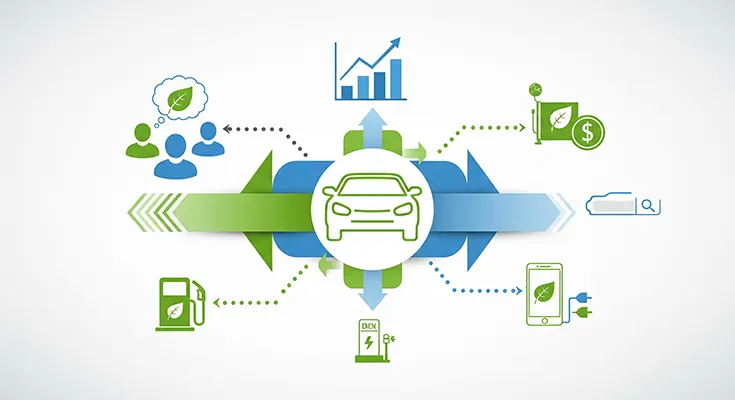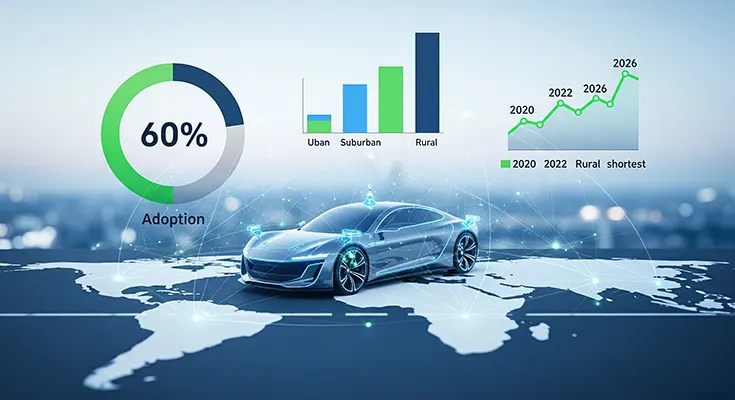The automotive industry’s green transition is no longer confined to the luxury segment. As environmental concerns, rising fuel prices, and government incentives converge, a new and powerful consumer trend is emerging: the demand for affordable, eco-friendly cars. While electric vehicles (EVs) grab the headlines, a closer look at consumer behavior reveals a more nuanced picture, with affordability, practicality, and a range of powertrain options driving purchasing decisions.
The Hybrid Hinge: A Bridge to a Greener Future
For many consumers, the jump to a pure electric vehicle can seem daunting. Concerns about upfront costs, charging infrastructure, and “range anxiety” remain significant hurdles.1 This is where the hybrid vehicle, and particularly the plug-in hybrid (PHEV), is proving to be a game-changer.
Hybrids offer a compelling middle ground. They combine the low running costs and reduced emissions of an electric motor with the convenience and long range of a traditional gasoline engine.2 This eliminates the fear of being stranded without a charging station and provides a smooth, gradual transition for those accustomed to gasoline cars. Consumer interest in hybrids has surged, and models like the Toyota Prius and Kia Niro PHEV consistently rank among the most popular green car choices.3 Their ability to deliver excellent fuel efficiency and lower emissions without the need for a fundamental lifestyle change makes them the preferred choice for a large segment of the market.
The Electric Accessibility Push
While hybrids are gaining traction, the push for truly affordable all-electric vehicles is at the heart of the market’s evolution. Brands that can deliver a compelling EV at a price point accessible to the average consumer are poised for significant growth.
- Lower Price Points: Carmakers are focusing on developing smaller, more efficient electric cars with lower-cost battery packs. The success of models like the Nissan LEAF and the more recent push by Chinese manufacturers like BYD to bring well-equipped, budget-friendly EVs to global markets is a testament to this trend.
- Government Incentives: Financial incentives, such as tax credits, rebates, and subsidies, remain a crucial factor.4 In many countries, these policies have been instrumental in bridging the price gap between traditional cars and EVs, making them a viable option for a broader demographic.
- The Promise of Lower Operating Costs: Consumers are becoming more savvy about the total cost of ownership. They are increasingly aware that while the initial purchase price of an EV may be higher, the savings on fuel, oil changes, and maintenance over the vehicle’s lifespan can be substantial.
Beyond the Powertrain: The Holistic Eco-Conscious Consumer
Today’s affordable eco-friendly car buyer is motivated by more than just what’s under the hood. Their decisions are shaped by a holistic view of sustainability and value.
- Environmental Concern: A growing awareness of climate change and air pollution is a primary driver.5 Consumers want a car that aligns with their personal values, and for many, that means one that reduces their carbon footprint.
- Practicality and Performance: Eco-friendly no longer means a compromise on performance. Consumers demand cars that are reliable, have a good driving range, and don’t sacrifice on safety or modern features like advanced infotainment and driver-assistance systems.
- Brand Image: The “green” image of a brand is becoming a key differentiator. Automakers with a strong commitment to sustainability throughout their operations, from supply chain management to recycling programs, are earning consumer trust and loyalty.
- Resilience to Price Shocks: The recent volatility in fuel prices has highlighted the economic benefit of vehicles that are less dependent on gasoline. The desire for a car that offers protection from unpredictable price swings is a powerful motivator for consumers looking for long-term financial stability.
The consumer market for affordable eco-friendly cars is in the midst of a transformation. It is a market that is increasingly mature, discerning, and driven by a blend of economic, environmental, and practical considerations. The brands that can successfully navigate these trends by offering a diverse range of affordable and high-quality hybrids and EVs will be the ones that win the race for the next generation of car buyers.













